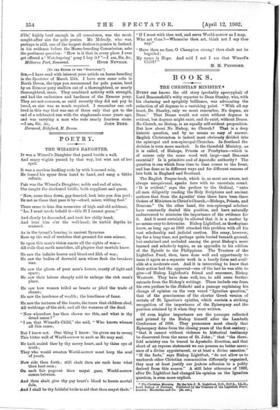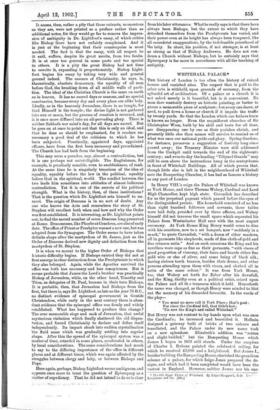BOOKS.
THE CHRISTIAN MINISTRY.*
EVERY one knows the old story (probably apocryphal) of Lord Beaconsfield's witty repartee to Dean Stanley, who, with his charming and sprightly brilliance, was advocating the reduction of all dogmas to a vanishing point. " With all my heart, Dr. Stanley, only we must remember, No dogma, no. Dean." That Deans would not exist without dogmas is evident, but dogmas might exist, and do exist, without Deans. No Church, no Bishop, is an equally self-evident proposition.. But how about No Bishop, no Church P That is a deep historic question, and by no means so easy of answer. English Christendom is indeed most obviously divided into the episcopal and non-episcopal Churches. In Scotland the division is even more marked. Is the threefold Ministry, as it is called, of Bishops, Priests or Presbyters—which is of course only the same word writ large—and Des cons essential P Is it primitive and of Apostolic authority ? The question is one which from time to time comes to the front,. and has done so in different ways and for different reasons of late both in England and Scotland.
The English Prayer-book, which is, as most are aware, not always unequivocal, speaks here with no uncertain sound. 0 It is evident," says the preface to the Ordinal, " unto all men diligently reading the Holy Scriptures and ancient authors that from the Apostles' time there have been these Orders of Ministers in Christ's Church,—Bishops, Priests, and Deacons." On the other hand, the non-episcopal scholars have constantly denied this position, and have naturally endeavoured to minimise the importance of the evidence for it. And it must certainly be allowed that it is a matter by no means easy to determine. Bishop Lightfoot, as theologians know, as long ago as 1868 attacked this problem with all his vast scholarship and judicial caution. His essay, however, lay for a long time, not perhaps quite buried beneath ground, but enshrined and secluded among the great Bishop's more learned and scholarly topics, as an appendix to his edition of the Epistle to the Philippians. The Trustees of the Lightfoot Fund, then, have done well and opportunely to issue it again as a separate work in a handy form and avail- able at a moderate cost. And it is interesting to know that their action had the approval—one of the last he was able to give—of Bishop Ligbtfoot's friend and successor, Bishop Westcott. They have done well, too, to add some further extracts from the Bishop's writings. These include one from his own preface to the Didache and a passage explaining his change of opinion on the very vexed " Ignatian question," that of the genuineness of the shorter Greek version of certain of St. Ignatius's epistles, which contain a striking recognition of the importance of the Episcopacy and the position attained by it when they were written.
Of even higher importance are the passages collected and printed by the Bishop himself after the Lambeth Conference of 1888. They pronounce most clearly that Episcopacy dates from the closing years of the first century ; "that it cannot without violence to historical testimony be dissevered from the name of St. John ; " that " the three- fold ministry can be traced to Apostolic direction, and that short of an express statement we can possess no better assur,' ance of a divine appointment, or at least a divine sanction." " If the facts," says Bishop Lightfoot, " do not allow us to unchureh other Christian communities differently organised, they may at least justify our jealous adhesion to a polity derived from this source." A still later utterance of 1889, after Dr. Lightfoot had changed his opinion on the Ignatian question, is "wen more explicit.
• The Chrtifiasi Ministry. By the late.I., B. Lightfoot.. D.D., D.C.L., Lord Bishop of Durham. Published by the Trustees of the Lightfoot Fund. London Macmillan and Co. [Si, Beta It seems, then, rather a pity that these extracts, momentous as they are, were not printed as a preface rather than as additional notes, fdr they would go far to remove the impres- sion of ambiguity in Dr, Lightfoot's essay, of which critics: like Bishop Gore have not unfairly complained. And it is just at the beginning that their counterpoise is most needed. The fact is that the essay, with all respect be it said, suffers, despite its great merits, from two faults. It is at once too general in some parts and boo special in others. It is a pity the great Bishop had not time to rewrite it, expanding it proportionately. Bishop Light- foot begins his essay by taking very wide and general ground indeed. The essence of Christianity, he says, is, theoretically, absolute democracy, the equality of all men before God, the breaking down of all middle walls of parti- -tion. The ideal of the Christian Church is the same on earth as in heaven. It has no sacred days or seasons, and no special sanctuaries, because-every day and every place are alike holy. Ideally, as in the heavenly Jerusalem, there is no temple, for God Himself is the temple ; the divine light is not gathered into sun or moon, but the process of creation is reversed, and, it is once more diffused into an all-pervading glory. There is neither Sabbath nor saint's day, for all days are sacred. But he goes on at once to point out that this is only an ideal, and that he does so should be emphasised, for it renders un- necessary a good deal of the criticism to which he has been subjected. Practically, appointed days, appointed officers, have from the first been necessary and preordained. The Churoh has had both from the beginning.
This may seem a paradox, nay, almost a contradiction, but it is one perhaps not unintelligible. The Englishman, for example, is peculiarly sensible, even to snobbishness, of rank. At the same time he is singularly tenacious of the idea of equality, equality before the law in the political, equality before God in the spiritual, world. The conflict between the two leads him sometimes into attitudes of almost ludicrous contradiction. Yet it is one of the secrets of his political strength. What is the history, then, of these institutions ? That is the question which Dr. Lightfoot sets himself to un- ravel. The origin of Deacons is in no sort of doubt. Any one who knows the Acts and remembers the story of St. Stephen will recollect both when and how and why the Order was first established. It is interesting, as Dr. Lightfoot points out, to find the sacred number of seven Deacons long preserved at Rome. Deaconesses, like Phoebe at Cenchrea, are also of early date. The office of Priest or Presbyter was not a new one, but was adopted from the Synagogue. The Order seems to have taken definite shape after the martyrdom of St. James, just as the Order of Deacons derived new dignity and definition from, the
martyrdom of St. Stephen. -
It is when we mount to the higher Order of Bishops that historic difficulty begins. If Bishops existed they did not at first emerge in clear distinction from the Presbyterate to which they also belonged. Again, while the Apostles survived the office was both less necessary and less conspicuous. But it seems probable that James the Lord's brother was practically Bishop of Jerusalem, while, on the other hand, Timothy and Titus, as delegates of St. Paul, became in their turn Bishops. It is probable, then, that Jerusalem had Bishops from the first, but there is, says Dr. Lightfoot, as late as the year 70 B.C., no distinct evidence of episcopal government in Gentile Christendom, while early in the next century there is abun- dant evidence that the episcopal office was firmly and widely established. What has happened to produce this change ? The ever memorable siege and sack of Jerusalem, that awful mysterious visitation which finally shattered the old dispen- sation, and forced Christianity to declare and define itself independently. Its impact shook into sudden crystallisation the fluid mass which was gradually settling into regular shape. After this the spread of the episcopal system was a matter of time, retarded in some places, accelerated in others, by local considerations. The same considerations had much to say to the differing importance of the office in different places and at different times, which was again affected by the straggles between clergy and laity, or between Bishops and Pope.
itere again, perhaps, Bishop Lightfoot seems ambiguous, and appears once more to treat the question of Episcopacy as a matter of expediency. That he did not intend to do so is clear from his later utterances. What he really says is that there have always been Bishops, but the extent to which they have detached themselves from the Presbyterate has varied, and their power- even at its height has always been tempered, like all sacerdotal exaggerations, by the indefeasible priesthood of the laity. In short, his position, if not stronger, is at least as strong as that of Bishop Andrews. He does not con- demn a Church without Bishops, but he certainly says that Episcopacy is far more in accordance with all the teaching of antiquity.











































 Previous page
Previous page